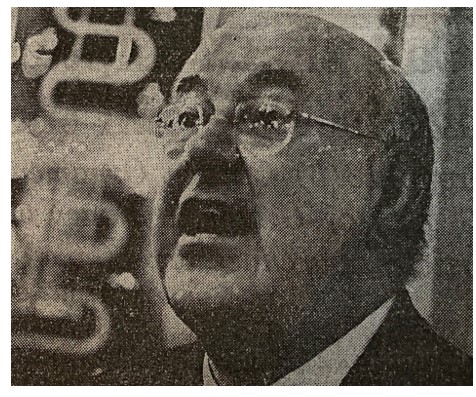
Puzzlers fête the man who wears out dictionaries
By Cyril Dunn

SINCE the war Mr Derrick Macnutt has worn out four copies of
Chamber’s Twentieth Century Dictionary – a sturdy volume, made to last. But Mr
Macnutt wears out dictionaries as other people wear out socks.
He does it by constantly thumbing through in endless search
of unknown words – paysa (say)or ribibe or hyetal – for the world’s most difficult crossword puzzle which, as
Ximenes, he has composed every week for 26 years for The Observer.
Last Sunday saw the publication of his 1000th
effort. On Thursday night, 360 from a uniquely gifted group of people who can
actually do a Ximenes puzzle
celebrated the occasion by having Mr Macnutt to dinner at the Café Royal, where
they toasted him as The Maestro.
Each item on the menu began with M, this being – as every
crossword addict knows -the Roman symbol for a thousand. Some slight cheating
occurred – Morecambe Prawns at the start and Mac-nutts at the end. There was a
poetic eulogy, composed by Mr Ronald Postill, until lately headmaster of
Victoria College in Jersey and himself a notable Ximenes Solver (‘Anon the
pennies drop; anon we smile; Chambers confirms etc.’). They gave Mr Macnutt a
gold fountain pen and a bound book with their signatures and an illuminated
address thanking him for ‘many happy, irritating hours’.
‘” Torturing” is another word they like to use,’ says Mr
Macnutt. For his solvers are people for whom the name Ximenes naturally summons
up its own erudite reference. The real Ximenes – from whom Mr Macnutt took his nom de plume – was a Cardinal and First
Torturer of some note as the Grand Inquisitor of his times.
Mr Macnutt, who lives in rural Sussex, plump and jovial,
proclaiming hisremote Irish ancestry. At the same time, he has a slightly
alarming air of authority.
And though the report-sheets he sends to his solvers are
often as obscure, as the puzzles themselves, it is at least clear that
sometimes he berates them quite sternly. ‘A terrible lot of unsoundness,’ he
says, and ‘I cannot agree with a very reasoned and often successful competitor
that “a whale’s body” can indicate “hale”’. Nothing makes him angrier than ‘a
dishonest clue’.
From 1928 to 1963 our Ximenes was a master at Christ’s
Hospital. He was drawn into crossword-composing by the death, in 1939, of his
predecessor Torquemada – Edward Powys Mathers, an expert on Oriental poetry,
whom Mr Macnutt now honours as ‘the real pioneer of the difficult puzzle’. He
sent to The Observer a puzzle of his
own composition with a tribute to Torquemada’s memory worked in the diagram.
This was published and at once he offered to do the job permanently. For some
time he shared it with tow others – a Wimbledon tennis umpire and an Eton
master – until in 1942 he took over alone.
He began slowly to evolve his own methods. He had found
Torquemada’s lay-out ‘rather messy’ and made his own symmetrical. Torquemada
was ‘very fond of literary allusions, quotations one had not ever heard of,’
and Ximenes ‘rather cut them down’. At the same time Mr Macnutt came under the
influence of a composer of whom he speaks with awe – Prebendary A F Ritchie of
Wells Cathedral, who, as Afrit, ‘did an extraordinarily difficult one in The Listener’. ‘His puzzles,’ said Mr
Macnutt, ‘had to be absolutely desperately difficult because The Listener gave a prize for every
correct solution.’
But Ximenes is no longer derivative: he has invented difficulties
which are entirely his own. ‘He does not’, he says mildly, ‘restrict himself to
everyday words. Half the words in his puzzle are from an ordinary vocabulary;
the others are words nobody has heard of.’ This is why he uses the Chambers dictionary
– ‘because it is Scottish and so full of words like “drookit”.’ For these, he
says, his clues are so designed that ‘the more skilful can do it without
opening the dictionary and without
having heard of the words.’
Even so, he says that by constantly trying, anyone can do a Ximenes puzzle, in time.
It is, he says, ‘a knack which certain people acquire.’ When he himself first
started on Torquemada, it was months before he could do more than two words. He
can do the Daily Telegraph in 15 minutes,
however.